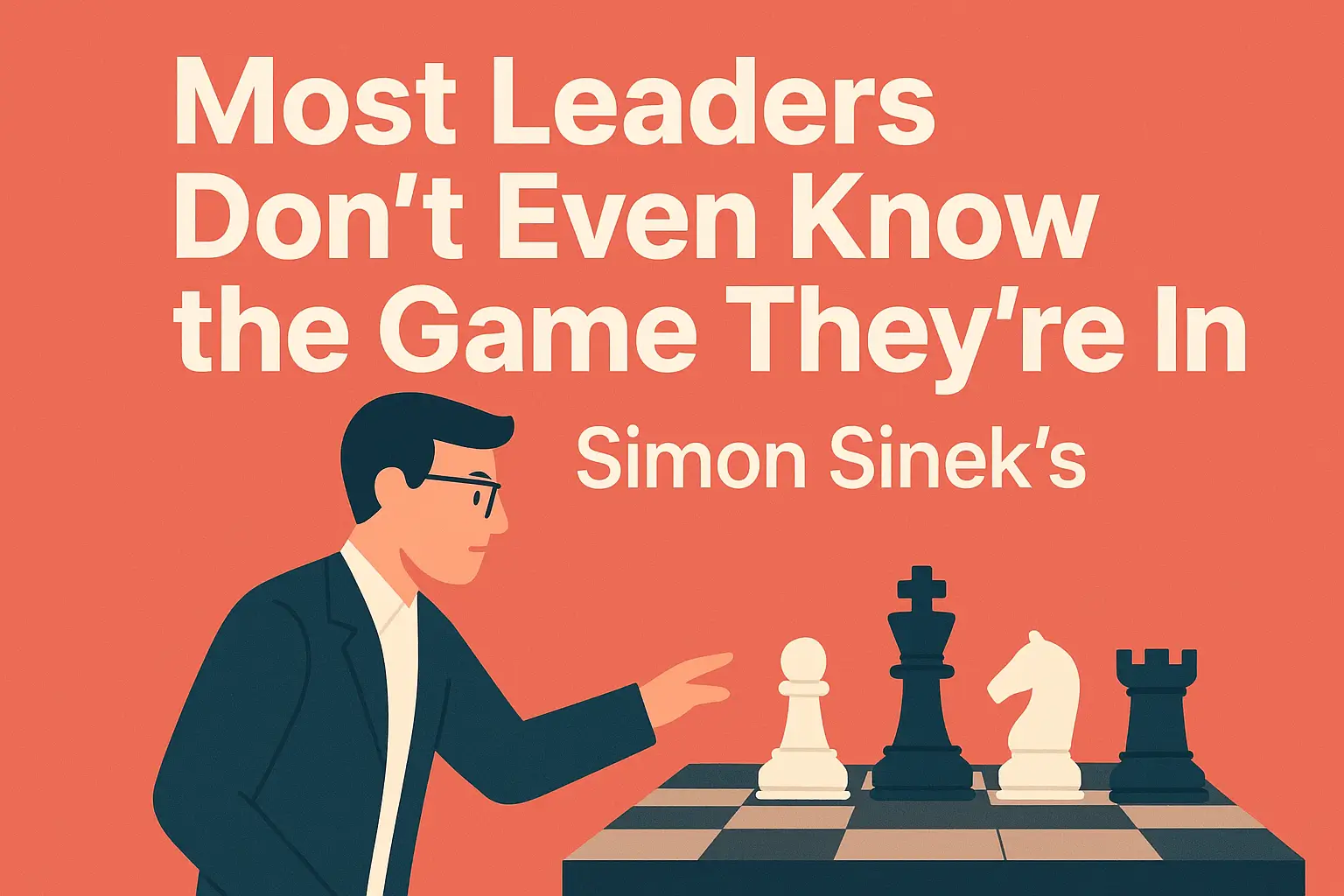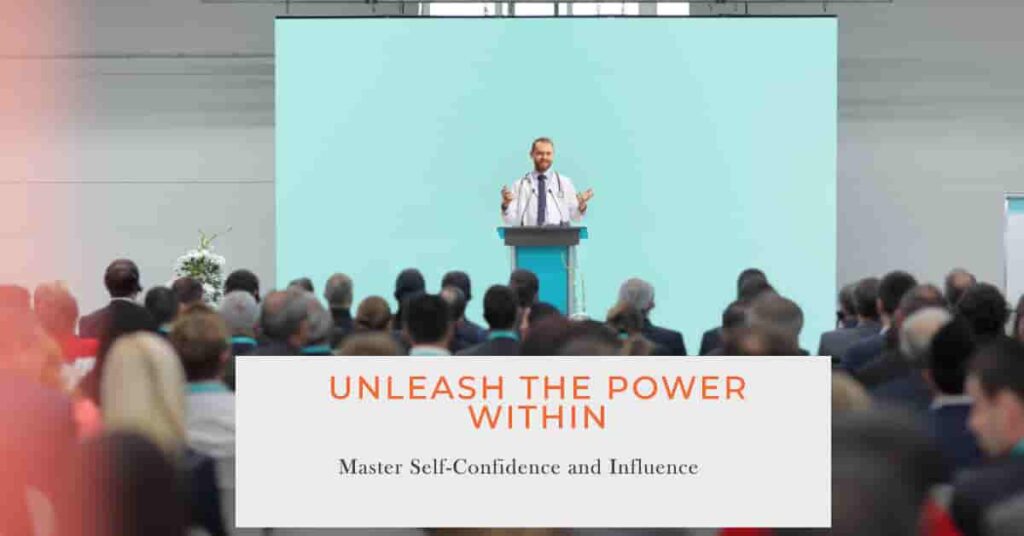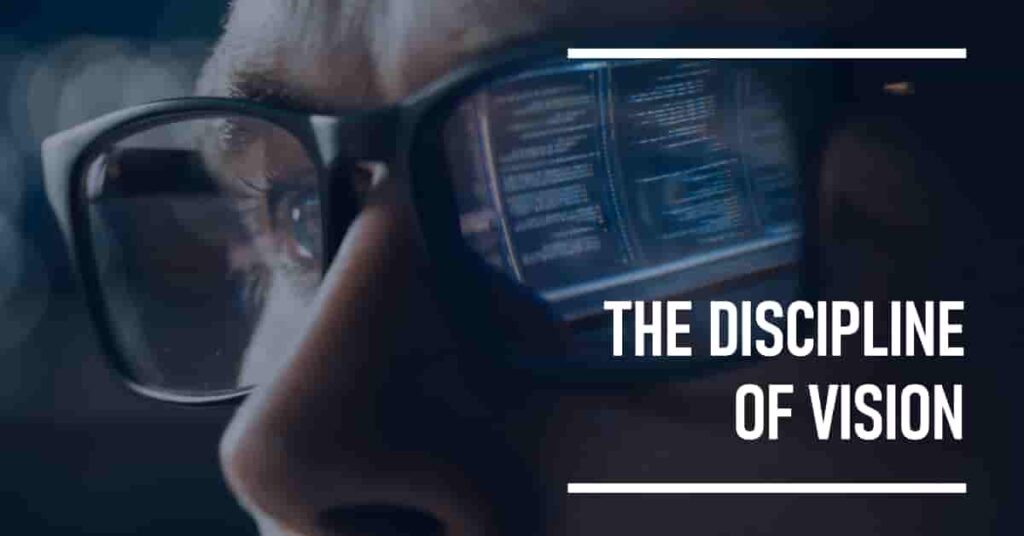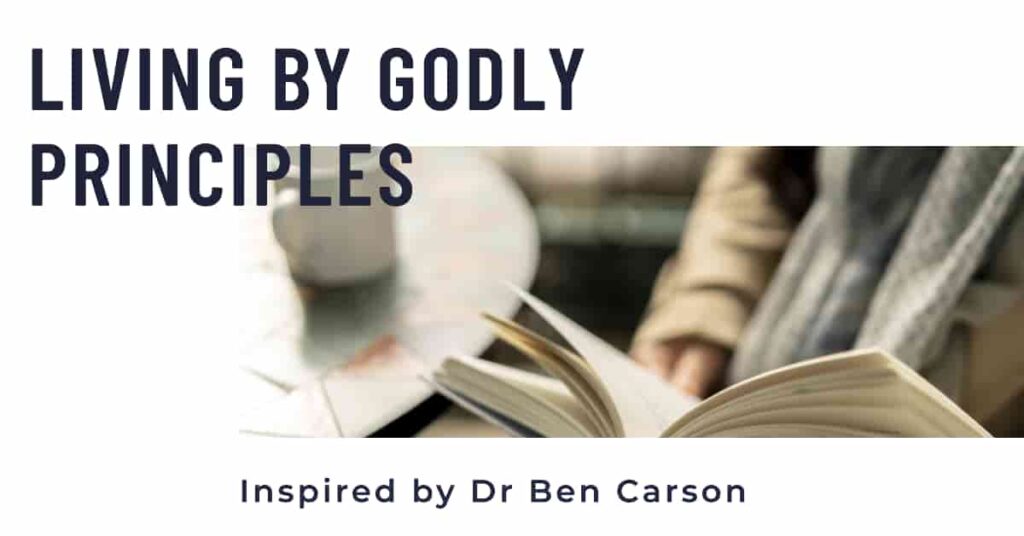
Most Leaders Don’t Even Know the Game They’re In – Simon Sinek’s
Simon Sinek argues that most modern leadership fails because leaders don’t practice two crucial things: empathy and the right perspective. Leadership isn’t about power or short-term wins — it’s about taking care of the people in your charge and seeing the work of an organization as an infinite game (no fixed end, rules changeable) rather than a finite contest with winners and losers. He shows how this mismatch—combined with cultural changes (parenting, technology, impatience) and outdated business models (shareholder supremacy, mass layoffs)—destroys trust, damages employee wellbeing, reduces long-term performance, and causes organizations to play the wrong game.
Core thesis and structure
- Leadership ≠ Being “in charge”
- True leadership: responsible for the wellbeing and growth of those you lead (give credit away; take responsibility when things go wrong).
- Many managers are promoted for technical skill, not trained to lead people; result = managers, not leaders.
- Two essential leader qualities: Empathy + Perspective
- Empathy: care about the human being, not only output. Ask “Are you okay?” not only “Why are your numbers down?”
- Perspective: understand whether you’re playing a finite or infinite game; align decisions with the right mindset.
- Millennial generation (used as a case study) — why many young people struggle:
- Parenting that over-valued “specialness” and unearned rewards → fragile self-image and low real confidence.
- Technology & social media → dopamine-driven interactions that discourage deep coping skills and real human connection.
- Impatience from instant-gratification culture → expectation for immediate career and life outcomes.
- Toxic environments that value metrics and short-term profits over people → erode trust and cooperation.
- Finite vs Infinite games (game theory applied to leadership & business)
- Finite game: known players, fixed rules, clear winners/losers (e.g., a sports match).
- Infinite game: players can change, rules are changeable, objective is to keep the game going. Business is an infinite game — there is no final winner; longevity and purpose matter.
- Most companies act like finite players (beat competitors, be #1 quarterly), but the survivors and category-defining companies adopt an infinite mindset (purpose-driven, play to last).
Important examples Sinek uses (what they illustrate)
- Four Seasons vs Caesar’s Palace (Noah the barista)
- Same role, very different leadership/culture. At Four Seasons Noah felt cared for and empowered; at Caesar’s he kept his head down. Conclusion: environment matters more than raw hiring — leaders create environment.
- Microsoft vs Apple
- Microsoft under Ballmer obsessed with beating Apple (finite); Apple obsessed with its mission (helping teachers/students) and with self-improvement (infinite). Apple competes primarily with itself to get better.
- Costco (Jim Sinegal)
- Long-term focus (“next 50 years” vs quarter-to-quarter) — an example of infinite thinking.
- Historical examples (Vietnam, Afghanistan)
- Finite-versus-infinite dynamics: finite players who play to “win” can get stuck against opponents willing to play indefinitely.
Deep dive: Empathy (what it is, what it looks like)
- Definition in context: Concern for the whole human, not just measurable outputs.
- Bad vs good approach:
- Bad: “Your numbers are down; improve or you’re out.” (threat)
- Empathetic: “Your numbers are down — are you okay? What’s going on?” (care + inquiry)
- Why empathy matters: it builds psychological safety, encourages admitting mistakes, increases cooperation, and sustains performance over time.
- Practical empathy actions (illustrated in talk): managers walk by and ask if staff need resources; leaders show genuine interest frequently, not only during reviews.
Deep dive: Millennials — four root causes Sinek outlines
- Parenting
- Many children were told they were “special” and received unearned rewards; this can weaken grit and true self-worth.
- Technology / Social Media
- Instant dopamine from likes, notifications; teens learn to seek validation from screens rather than human relationships; coping skills with stress are underdeveloped.
- Impatience / Instant gratification
- Expect immediate results for career and relationships because they grew up in a world of on-demand services and instant feedback.
- Environment (workplace cultures)
- Corporate focus on metrics and shareholder value creates anxiety, fear, and erodes trust; mass layoffs signal that tenure and effort aren’t valued — destroying psychological safety.
Finite vs Infinite games — key implications for leaders & organizations
- Misdiagnosis: Many leaders declare “we must beat X” or “we’re #1” — but without agreed rules and a fixed finish line, that language is meaningless and short-sighted.
- Infinite mindset behaviors: prioritize purpose/mission (“why”), invest in people and culture, plan for longevity, and measure success with long-term indicators.
- Consequences of finite play: Quarterly-obsessed strategies, short-term layoffs, fear-driven cultures, and fragile companies that collapse or merge when they lose will to continue.
- How infinite players win: they don’t necessarily “win” a battle every day, but they outlast or out-frustrate competition because they build resilience and a compelling purpose.
Concrete leader behaviors Sinek recommends
- Shift from “in charge” language to “responsible for.”
- Give away credit; take responsibility when things go wrong.
- Practise daily empathy — check in, ask real questions, seek to understand.
- Create environments where people can be themselves and admit mistakes without fear.
- Resist or rethink mass layoffs — understand how every company decision is a communication that affects trust.
- Reorient strategy from beating competitors to advancing a purpose that perpetuates the organization.
- Train leaders: leadership is a learned skill and must be taught, practiced, and reinforced.
Practical checklist for applying Sinek’s lessons (for a leader or org)
- Replace “be in charge” language with lines like “I’m responsible for my team.”
- Institute regular 1:1s focused on wellbeing, not just KPIs.
- Teach managers how to transition from doer → coach (training, role-play).
- Evaluate performance processes: do they allow for empathy and development?
- Review layoff policies; add contingency plans that preserve trust where possible.
- Embed long-term KPIs and mission metrics into board-level reporting.
- Model presence: reduce phone distractions in meetings; leaders role-model attention.
- Reward leaders for developing others (promotions tied to team outcomes, not only financials).
- Run “infinite game” strategy sessions: articulate purpose and 5–10 year commitments.
- Audit talent systems — ask whether environment or people issues are really root causes.
Reflection questions for leaders & teams
- Do I see my role as “in charge” or “responsible for the people in my charge”?
- When was the last time I asked someone on my team “Are you okay?” and meant it?
- Are our company decisions signaling “we value people” or “we protect numbers first”?
- Do our incentives encourage short-term wins or long-term resilience and purpose?
- How much psychological safety exists in our day-to-day operations?
Short list of memorable lines / paraphrased quotable from the talk
- “Leadership is not about being in charge; it’s about taking care of those in your charge.”
- “Leadership is a skill like any other — it must be practiced.”
- “Business is an infinite game — the objective is to keep the game in play.”
- “The company communicates every time it takes an action — layoffs destroy trust overnight.”
Consequences Sinek highlights (real-world harms)
- Increased depression and requests for leaves of absence among students/young workers.
- Superficial friendships and weaker coping mechanisms due to social-media-driven behavior.
- Work cultures of fear where people hide mistakes => less learning, more risk of catastrophic failure.
- Companies that chase quarterly wins become vulnerable to being outlasted, merged, or bankrupted.
Short action plan (3 steps you can take immediately)
- Start practicing empathy daily — in the next week have a genuinely curious, non-judgmental 1:1 with each direct report.
- Hold a leadership discussion on “What game are we playing?” — ask: are our decisions aligned to a 1-quarter or 50-year horizon?
- Create one change to strengthen psychological safety (e.g., public “I screwed up” minutes or a safe mistake-sharing forum).
Conclusion
Sinek’s talk is a call to rewire leadership: care more for people and change perspective from winning short-term contests to sustaining an ongoing purpose. Empathy rebuilds trust and cooperation; the infinite mindset reorients strategy toward durability and meaningful work. The payoff is not a quick metric — it’s an environment where people like “Noah” show up as their best selves, and organizations that last.



